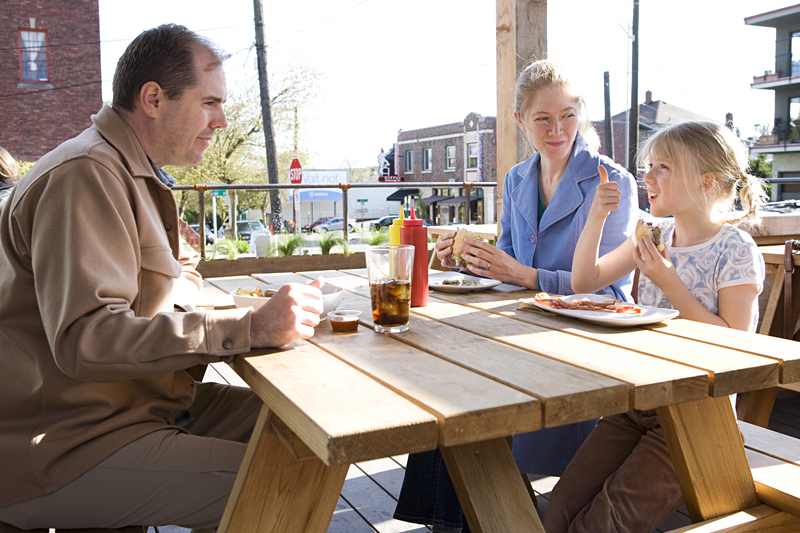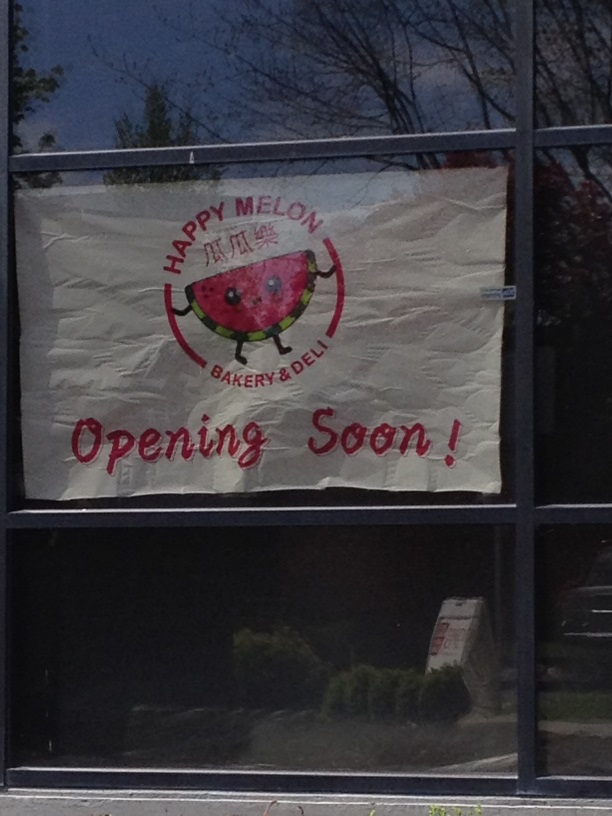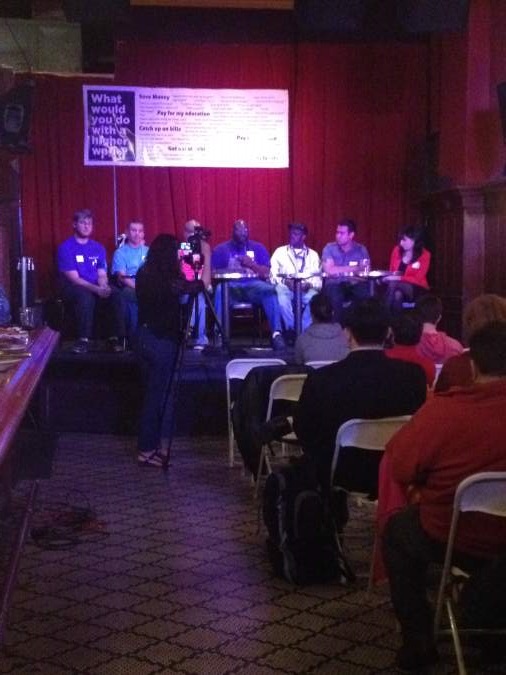On most nights, Uneeda Burger‘s dining room resembles a baby-product showcase. The pared-down room’s hipness quotient—reflected in its salvaged front counter, windowed kitchen, and subjective chalk diagram of a cow (the shank’s labeled “good,” while the flank merits a “very good”)—is largely lost in the bustle of family dining and the accoutrements it demands. Parents drag their offspring to the hugely popular Fremont joint in strollers, car seats, and slings, creating a mini-museum of infant-transport devices. The adults responsible for the infants within don’t needa burger; they needa babysitter.
Uneeda’s burgers are odd by traditional standards. The patties have a tendency to collapse, and the condiments don’t congeal into a single mass of burger betterment. Instead, each burger presents a kaleidoscope of sophisticated flavors. If Willy Wonka was a cattleman instead of a candy manufacturer, he probably would have forgone his three-course gum for a “Medi-terra”—a lamb burger burnished with charred peppers, sharp manchego cheese, tempura lemons, and ruffles of arugula.
It seems parents are intensely grateful. After a fancy dinner has gone from being “something we haven’t done in a while” to “something we’ll probably never do until these rugrats are out of the house,” it must be thrilling to rediscover the hallmarks of steakhouse cuisine filed under Uneeda’s signature burger #2. Behold the beefy juiciness of a rib eye, the tang of blue cheese, the snap of salad greens, and the savor of caramelized onions—all without the hassle of hour-long waits between courses and prices that threaten the ability to make mortgage payments.
Check out a slideshow of mouth-watering food porn from Uneeda Burger.
The #2 costs $7.25, making it the cheapest of Uneeda’s ooh-la-la beef burgers. The price goes up to $9 for a sandwich topped with ham, cheese, and an egg. Another $4 buys an upgraded patty of earthy, grass-fed Wagyu beef from Whidbey Island’s Crescent Harbor Ranch. Staffers report they hear a fair amount of griping about the prices, but the complaints are off-base: Uneeda’s meticulously crafted burgers are excellent, and well worth what the restaurant is charging. Wine prices, though, would benefit from some tinkering: The cheapest glass is $6.50, or $2.50 more than a plain quarter-pound burger.
According to chef/owner Scott Staples, the plain burger accounts for about 40 percent of Uneeda’s sales, a figure that might be inflated by the hordes of children who couldn’t abide a burger topped with roasted chili relish and cilantro. It’s a shame more customers don’t treat themselves to Uneeda’s naked burger, as the subtle, drippy meat is too easily eclipsed by the strong flavors of ingredients that are more bistro than ballpark.
A burger seasoned with ritzy-sounding black-truffle salt and trimmed with deeply sautéed button mushrooms, shallots, and Gruyère tastes like a solidified French onion soup. And woe to the customers who waste their Wagyu dollars on a burger smeared with a vinegary, Lexington-style barbecue sauce and capped with a wig of faintly greasy fried onions. It’s not a bad sandwich, but it relegates beef to a nonspeaking role.
By contrast, eaters who take their burgers unadorned are more likely to appreciate their succulence, which Staples achieves through a meat mix that’s 75 percent lean and 25 percent fat. “We started out with 70–30, but it was a little much,” says Staples, who’s wanted to get into the burger business since before he opened Quinn’s, his Capitol Hill gastropub. Uneeda’s inspiration came from a trip to Taylor’s Automatic Refresher, the Napa Valley sensation (now known as Gott’s Roadside) that slowed down fast food for generations of gourmands.
“We went to Taylor’s Refresher and my wife and I were like, oh my God, this is brilliant,” Staples remembers. “It was, like, Seattle needs something like that.”
Staples began scouting for a commercial venue with adjoining outdoor space that could be retrofitted as a casual restaurant. He initially concentrated on greenhouses for sale, his vision perhaps buoyed by tree-lined recollections of Taylor’s, but finally settled on the former home of Uneeda Auto & Built Rebuild. The building’s working-class roots are reflected in a few smart decor elements, including a framed collage of sew-on name patches liberated from service-station shirts and a working garage door that staffers pop open whenever sunshine beckons.
Much of Staples’ burger-learning legwork focused on toppings, as he was interested from the start in developing a complete burger which showcased ingredients that rarely share a sesame-seed bun.
“I mostly looked around here, and there was no one with classical experience addressing burger toppings,” he says. The trick, Staples adds, was finding cooks comfortable in the classical idiom who wanted to flip burgers.
Staples reports he’s been pleased with Uneeda’s first four months, although he plans to pencil in a few lineup changes. He’s moving the signature burgers to Kaiser rolls and he’s dropping the croque madame (which he reasons is just the croque monsieur with an “add egg” request) to clear a spot on his 10-burger menu for elk. Uneeda customers apparently are starved for game.
“Those specials sell so well, I’m just amazed,” Staples says of the restaurant’s periodic forays into elk and water-buffalo meat. Indeed, they sell so well that every time I visited Uneeda, the special was already sold out. But there are plenty of other options for customers not craving cow.
Uneeda makes its veggie burger by boiling portobello mushrooms and farro in vegetable stock, then spreading the resulting sludge in a pan and roasting it. A square of the stuff is topped with lettuce, tomato, red onions, and a “special sauce” with a horseradish bent. Like lentil casserole and natural peanut butter, the sandwich is healthful in the most joyless ways. The leathery flap of grain is a doppelgänger for dry meatloaf crust.
Far better is a buffalo chicken sandwich, made with wonderfully tender, pink meat. The sandwich boasts the perfect ratio of Frank’s RedHot sauce to blue-cheese dressing, recalling the best wing-eating sessions. Uneeda also sells salads, although they’re so secondary to the restaurant’s central plot that my order for a Cobb salad produced a chopped salad. There’s a daily soup special, and chili based on Staples’ memories of his mother’s recipe. The onions are hastily trimmed and the pinto beans are tough. But the beef’s so robust that all’s forgiven.
If you share Staples’ topping excitement, you might consider putting chili on your fries, which come from the Wendy’s camp of fry philosophy. Slender and salty, they’re a good alternative to the waffle-cut fries that underlie what Staples calls poutine—much to the exasperation of his Canadaphile customers, who apparently are deeply offended by Uneeda’s use of a macaroni-ready white cheese sauce to cut its sonorous beef gravy.
“I’m changing the name of it,” Staples says. “We’ve had people come in and they’re, like, ‘That’s not poutine.’ “
Unfortunately, those nags are right. But the dish doesn’t taste any worse for the misapplied nomenclature, just as calling ground beef, charred onions, and Gruyère a “burger” doesn’t make the eating experience any less special.
Price Guide
The Classic $4
BBQ Smash $8.50
Mushroom burger $8
Veggie burger $6.25
Chicken sandwich $6.50
Fries $2.50
Poutine $6









